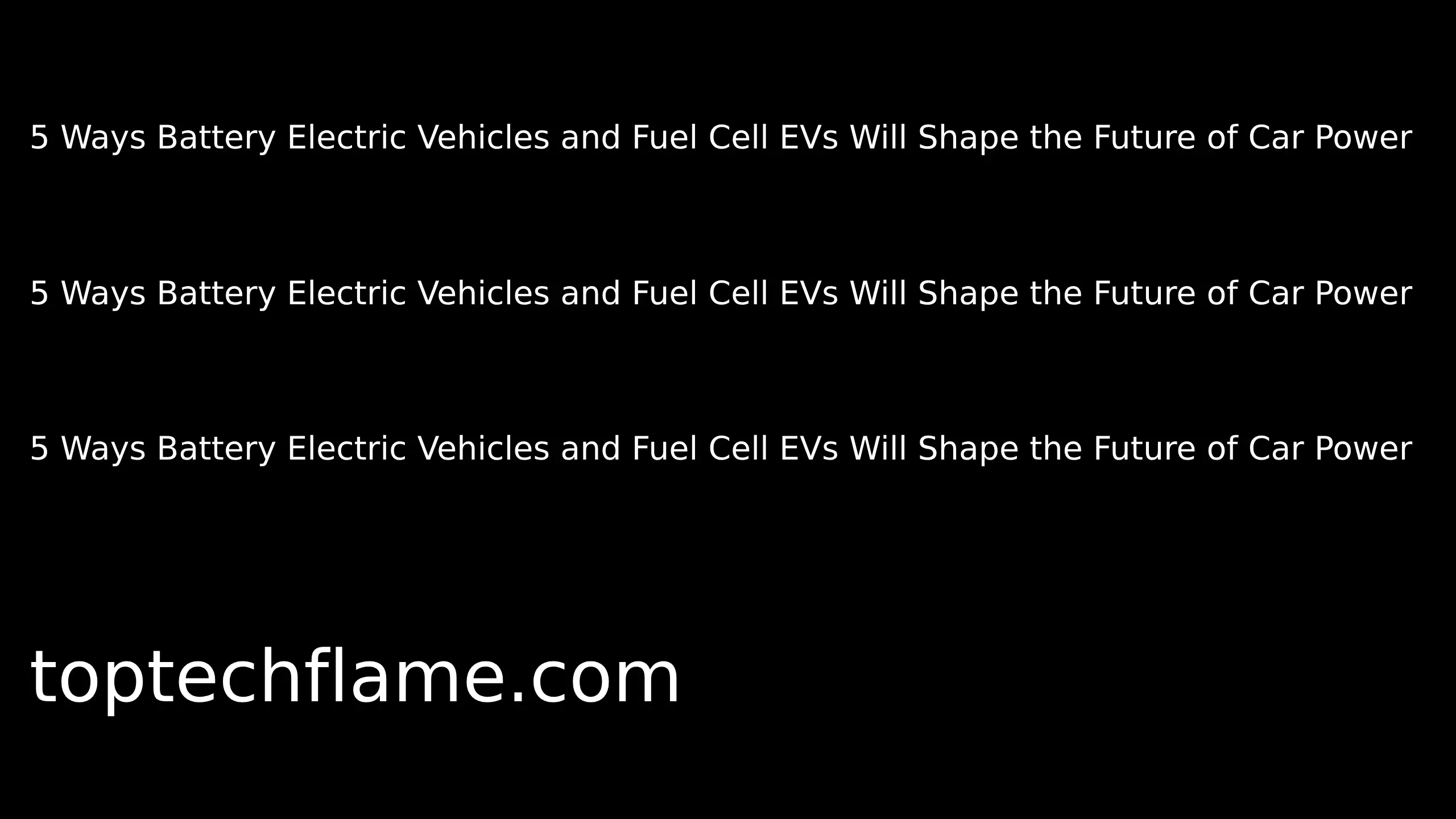Electric Vehicles
Electric Vehicles are doing well in the automotive world, and the popularity of technology cannot be denied. Two primary types are forming the future world of car power and FCEVs.It discusses reduced carbon emissions and brings innovative answers to energy storage, power generation, and efficiency. Electric Vehicles promise exciting alternatives to the usual internal combustion engines (ICE) for a cleaner and more sustainable future.
Reduction in Carbon Emissions and Air Pollution
The most dramatic benefits from electric vehicles, particularly BEVs and FCEVs, are the possibility of significant carbon emissions cuts and better air quality. Gasoline and diesel cars produce enormous quantities of greenhouse gases in the form of carbon dioxide, methane, and nitrous oxide, contributing to global warming and air pollution. BEVs run on electric power stored in batteries and have zero tailpipe emissions. FCEVs, which generate electricity by converting water and energy from hydrogen, emit only water vapour, yet bringing another option as clean as a BEV.
Because government rules that the sitting of authorities continue to tighten these even further on emissions brought about by automobiles and persuade people to use electric vehicles, far more utilization of BEVs and FCEVs is expected to play a significant role in changing climate change. These vehicles can lower urban pollution levels and enhance public health, further lessening the overall environmental impact of the automotive industry. Growing renewable energy sources, like solar and wind power, ensure electricity comes from clean sources when Electric Vehicles use electricity.
Advances in Battery and Hydrogen Fuel-Cell Technology
The development of two major technologies, a battery and a hydrogen fuel cell, will be the backbone of the future of electric vehicles. Today, Battery Electric Vehicles are powered mostly by rechargeable lithium-ion batteries. Energy density, charging speed, and longevity have developed considerably in the last ten years with lithium-ion batteries. However, research continues to create far better than those, such as far higher energy capacity, charging times, and safety, such as solid-state batteries.
On the other hand, fuel cell vehicles use a hydrogen fuel cell to power the car electrically through the chemical reaction between hydrogen and oxygen. Fuel cell technology is becoming more advanced, with a super progression in efficiency, decrease in costs, and hydrogen storage. They have the advantage of offering higher ranges compared to batteries, meaning FCEVs are suitable for longer drives and heavy-duty vehicles such as trucks and buses.
The future for Electric Vehicles thus greatly depends on improvements in batteries and fuel cells as they strive to become more viable and accessible to a broader population. The cost of Electric Vehicles will be competitive with gasoline-fueled vehicles when the owning or operating cost is comparable or within some specified percentage, such as parity with gasoline-fueled, or closer to existing gasoline-fueled owners when prices are reduced due to decreasing cost for batteries and the deployment of hydrogen infrastructure.
Expansion of Charging and Refueling Infrastructure
Electric Vehicles will finally shape the future of car power in the wake of charging and refuelling infrastructure. BEVs depend on a recharging infrastructure because they are electric, while FCEVs depend on hydrogen refuelling stations. Availability and convenience in such stations play a crucial role in adopting electric vehicles.
In the last decade, heavy investments have been made in developing public charging networks for BEVs. Fast charging is now seen on more urban streets and highways and even at private residences, significantly reducing the charge time for electric vehicles and thus opening long-distance travel. Hydrogen refuelling stations are being built in Japan, Germany, and the United States for Fuel-Cell Electric Vehicles.

The involvement of these governments, automakers, and energy companies in building this infrastructure means that BEVs and FCEVs will become increasingly viable alternatives for consumers. Since the range anxiety, or the fear of running out of battery or hydrogen before reaching a charging or refuelling station, will decline with increased infrastructure, Electric Vehicles will be seen as a viable alternative for even more drivers, thus expanding the EV market further.
Integration with Renewable Energy and Smart Grids
One of the exciting ways Electric Vehicles will change the map of the future regarding car power is through their integration with renewable energy sources and smart grids. Even as the world starts to turn towards cleaner energy production, such ‘clean’ cars as BEVs and FCEVs could play a pivotal role in balancing the demand and supply of energy.
Vehicle-to-grid technology offers the integration of battery electric vehicles into smart grids. V2G enables vehicle users to use their cars as mobile energy storage units, thus storing excess electricity generated by sources such as solar and wind during low-demand conditions and feeding it back into the grid during peak-demand conditions. It allows the stabilization of the grid, reduces reliance on fossil fuels, and makes for a much stronger energy system. Additionally, proprietors of EVs can feed that energy back into the grid to generate an income or accrue credits that make the acquisition of EVs even more desirable.
Fuel-cell electric Vehicles also contribute to the grid’s strength by producing electricity with hydrogen. In the future, hydrogen can be produced by electrolysis that splits water into hydrogen and oxygen using electricity produced through renewable sources. This “green hydrogen” can be stored in tanks or containers and then consumed using fuel cells, generating electricity only when required, thus making it a clean and flexible power source.
BEVs and FCEVs will help connect Electric Vehicles to renewable energy and smart grid systems, helping to create a sustainable, low-carbon energy future that can benefit transportation and the energy sector.
Shaping the Future of Mobility and Transportation
Electric Vehicles are not only changing the face of car power; they are also reshaping the future of mobility and transport. The penetration of EVs in cities, especially as an additional option for daily mobility, is driving wider changes in how people move around, changing towards cleaner, smarter, and more efficient ways of transport.
For example, some shared mobility services nowadays include ride-hailing, car-sharing, and electric scooters. Quite a number of these services are adopting Electric Vehicles to cut down on emissions and provide a sustainable alternative to transportation in general. The electrification of public transport buses and trains is also picking pace as cities worldwide invest in electric vehicle fleets that aim to reduce traffic congestion and improve air quality while cutting operational costs.
Apart from shared mobility, autonomous driving technology is an essential ingredient for the future of Electric Vehicles. It is apt for BEVs and FCEVs because these two electric technologies require less maintenance and are friendly to ADAS. Autonomous Electric Vehicles will transform transportation into a safer, better, and more accessible journey for people who do not or cannot drive, such as older people or people with disabilities.
Besides, electric vehicle popularity is spurring changes in vehicle development. Vehicle designs and engineering are becoming lighter and more aerodynamic. They have been optimized to improve BEV and FCEV efficiency and longer range. Other innovations, such as wireless charging, modular battery systems, and similar ones, continue to advance the possibilities beyond what electricity-based vehicles can do.
In the not-so-distant future, electric vehicles- presently battery-powered or hydrogen-fueled- will be moving this country, thinking about transportation in a new light. EVs, short for electric cars, will provide the planet with cleaner, brighter, and more flexible mobility options.
Conclusion
Battery Electric and Fuel-Cell Electric cars represent the future of car power since they emit significantly less carbon and clean up the air and the entire mode of transportation. Advances in battery and fuel-cell technology, with increased charging and refuelling infrastructure, will introduce electric vehicles into general day-to-day use. Integrating EVs with renewable energy and smart grids will further expand their importance for creating sustainable energy futures. At the same time, developments in mobility and autonomous driving will change the future of transportation.
The advent of Electric Vehicles into our world will bring a much cleaner, greener, and more efficient future for car power, both in the environment and society. EVs will secure their space to showcase that shifting towards a sustainable transportation system is not only possible but inevitable. Electric vehicles are here to stay and will play a pivotal role in shaping the future of car power.


